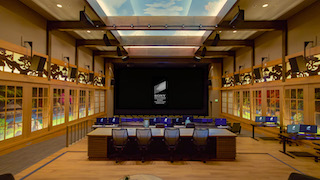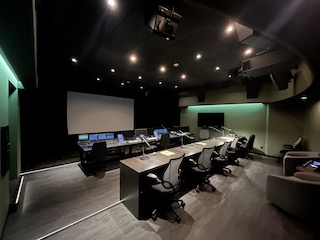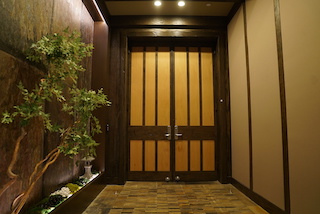 Sony Pictures Post Production Services is celebrating the completion of the final phase of a multi-year effort to expand and modernize its motion picture and television sound facilities. Aiming to establish an inviting, state-of-the-art space for filmmakers and creative sound artists, the studio has integrated the latest immersive sound technology across 14 mix stages on its lot in Culver City. It has also made extensive aesthetic improvements. Its historic Cary Grant, William Holden, Kim Novak, Burt Lancaster, and Anthony Quinn mix stages have been restored to sparkling condition, with new acoustics, cinema screens, creature comforts and creative support.
Sony Pictures Post Production Services is celebrating the completion of the final phase of a multi-year effort to expand and modernize its motion picture and television sound facilities. Aiming to establish an inviting, state-of-the-art space for filmmakers and creative sound artists, the studio has integrated the latest immersive sound technology across 14 mix stages on its lot in Culver City. It has also made extensive aesthetic improvements. Its historic Cary Grant, William Holden, Kim Novak, Burt Lancaster, and Anthony Quinn mix stages have been restored to sparkling condition, with new acoustics, cinema screens, creature comforts and creative support.
“We want filmmakers and sound talent to feel inspired when they walk onto our lot,” says Kimberly Jimenez, senior vice president, post-production services. “We offer sound facilities that are at the highest level of technology in an environment that is warm and welcoming. There’s nothing like it in our industry.”
The project began in 2019 with the renovation of the studio’s 325-seat Cary Grant Mix Stage, one of the industry’s largest. To support immersive sound formats including Imax and Dolby Atmos, the studio was equipped with new sound tech, including a dual 2 x 24 fader Avid S6 console, four Avid Pro Tools HDX-3 workstations, a 192-channel HDX-3 Pro Tools recorder and a stunning JBL speaker array. A 50-foot by 20-foot cinema screen and 4K projector complete the true theatrical experience.
 “It’s a haven for audio and visual perfectionists,” says Lane Burch, executive director, post-production sound engineering. “We offer the perfect blend of cutting-edge technology, comfort, and creativity.”
“It’s a haven for audio and visual perfectionists,” says Lane Burch, executive director, post-production sound engineering. “We offer the perfect blend of cutting-edge technology, comfort, and creativity.”
From there, the work proceeded systematically to the Kim Novak, Burt Lancaster and Anthony Quinn and, most recently, William Holden mix stages, with each furnished with near identical mixing, editing, reproduction and projection systems. The studio’s other stages were also upgraded, establishing a uniform workflow studio-wide. “Standardization was a principal focus,” says Burch. “Each room uses the same technology, and they have similar acoustical environments. Projects can move between our stages without modification or disruption.”
Additionally, the stages went through a transformative physical restoration with an eye toward optimizing acoustics, aesthetics and comfort, while preserving their historic ambience, unique décor and stunning architectural features. For example, the Anthony Quinn Mix Stage’s Japanese-themed fountain, artwork and domed ceiling were restored while incorporating the latest acoustical panel and other sound absorbing features.
“Our stages were built with style,” notes Jimenez. “They are beautiful structures. What better place to work on a soundtrack than at a functioning movie studio. This is a special place.”
 Two-time Emmy Award-nominated supervising sound editor Mandell Winter has followed the expansion of Sony Pictures’ sound department closely and is elated with the results. “The engineering team was methodical in the way they upgraded the rooms and made each one the best it can be,” he says. “I have clients who only want to mix at Sony because of the vibe of those stages. They know it’s going to make a difference.” Winter’s work at Sony Pictures includes all three films in The Equalizer franchise.
Two-time Emmy Award-nominated supervising sound editor Mandell Winter has followed the expansion of Sony Pictures’ sound department closely and is elated with the results. “The engineering team was methodical in the way they upgraded the rooms and made each one the best it can be,” he says. “I have clients who only want to mix at Sony because of the vibe of those stages. They know it’s going to make a difference.” Winter’s work at Sony Pictures includes all three films in The Equalizer franchise.
Academy Award-nominated and two-time Emmy Award-winning re-recording mixer Tony Lamberti says he prefers to mix film and television projects at Sony Pictures because the consistency and reliability of the mix stages are unmatched.
“I’ve done many movies at Sony, and I’m thrilled every time I hear one in the field,” he says. “Whether it’s at the Motion Picture Academy or a commercial movie theater, the sound translates perfectly. I know that the hard work I put into the soundtrack is going to translate to the audience, and that’s the most important thing to me.” Lamberti’s mixing credits at Sony Pictures include Spider-Man: No Way Home, Spider-Man: Into the Spiderverse, and The Woman King.
The lot has been producing soundtracks for more than 100 years, including some of the most beloved movies and television shows. Through Sony Pictures Entertainment’s commitment to remaining ahead of the curve of technology and responding to the industry's creative needs, it continues to be a magnet for visionary filmmakers and award-winning sound mixers, editors, and designers.
“We are continuously growing, expanding and looking toward what comes next,” says Jimenez in explaining the studio’s success. “We work as a team, and we are always looking for ways to improve and do things better.”
